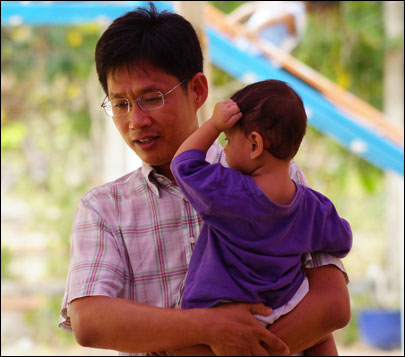From killing fields to healing fields
PHNOM PENH, Cambodia ― Kim Gi-dae, a missionary and principal of a vocational school in Cambodia, takes a lengthy pause when he is asked in which years his three children are at school. Koreans tend to ask ages indirectly.
The person who asked the question teases him, “You are their father. You don’t even know your children’s ages?”
Kim apparently had to calculate in his head which grades his children were supposed to be in. What he doesn’t say is that his children occasionally had to be homeschooled because he did not have enough money to send them to school.
In the early 2000s, Kim ran a boarding house near the Royal University of Agriculture in Phnom Penh, the capital of Cambodia for students. To support their lodging, he would give up the school education of his own children, Kim Dae-gyu, his close friend from the same hometown in South Gyeongsang Province, told this reporter.
Kim arrived in the South Asian country in November 2000 with his wife and three children. He had been a veterinarian in Korea, but later studied theology and local government.
When he decided to become a missionary, he did not seek to preach to people about God. He wanted to promote a “beautiful balance” in which people were healthy “physically, mentally, socially and spiritually.” To him, Cambodia seemed to be the place that needed the balance most.
The Cambodian civil war in the 1970s left the country deeply scarred both economically and psychologically.
During the war, the communist Khmer Rouge regime is believed to have killed 1.7 million people, many of whom were the educated intelligentsia.
These days, the economy is growing at relatively fast pace, but poverty prevails across the nation. The inflation-adjusted GDP per capita was estimated at $2,200 in 2011, ranking it at 187th among 227 countries, according to U.S. Central Intelligence Agency data.
Kim set his mission as transforming Cambodia’s infamous killing fields into “healing fields.”
His target for that transformation was villages. He saw urbanization as a vicious cycle in which farmers left their villages for better paying jobs in the cities but end up struggling in the gutter; while villages, short of the labor, become poorer. He said he wanted Cambodians to learn that they can be economically independent and lead a sustainable life by staying in their villages and uniting in communities.
Kim moved to Takeo, an impoverished province, with the students at his boarding house who became teachers at the Institute of Sustainable Agriculture and Community Development (ISAC), a vocational school set up by Kim in 2003 to foster community leaders.
The annual tuition at the ISAC is $50, and students are required to bring 20 kilograms of rice each month for their own meals when they return from a three-day break in their hometowns. Students live in a dormitory and study agriculture, languages and basic IT skills. “The tuition is to protect their ego,” Kim said.
When students graduate, he makes available a loan of two pregnant pigs and feed worth $1,000 that is payable in two years with a one-year grace period.
Kim teaches the students how to raise pigs organically, and the high qualify pork from the farm at ISAC is sold at high prices to Koreans in Phnom Penh. As pork imported from Thailand and Vietnam flood the market and the price has fallen, Kim is now looking for ways to add value including processing the meat into ham and sausages.
Throughout the interview, Kim rarely spoke about the difficulties he has had in Cambodia. He briefly mentioned dengue fever that his wife suffered from. Fluent in Khmer, Kim whose skin got “irreversibly” tanned easily blends in with the locals.
After a dozen years in Cambodia, however, Kim feels there remain too many tasks to be fulfilled.
He regularly writes a newsletter to his supporters. After meeting him in Cambodia, this reporter got onto his mailing list.
A letter that arrived recently said, “Dear God. Please help us build a community college, pig and chicken farms, facilities to produce sausages and hams, and the market and shops where we can sell them.
“It’s not about me wanting to live and eat well. It seems the goal is right in front of my nose… but why is it so distant?” <The Korea Times/Kim Da-ye>


























































